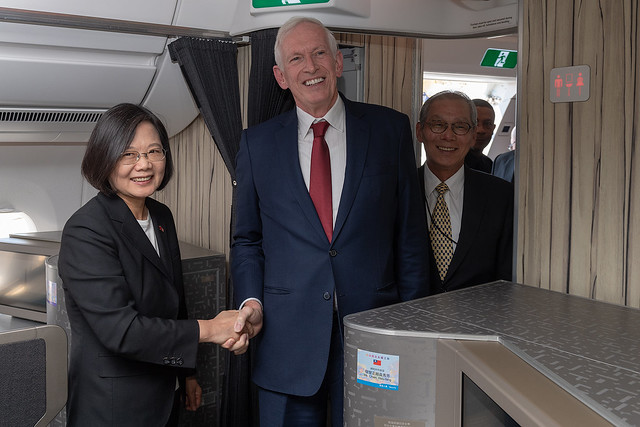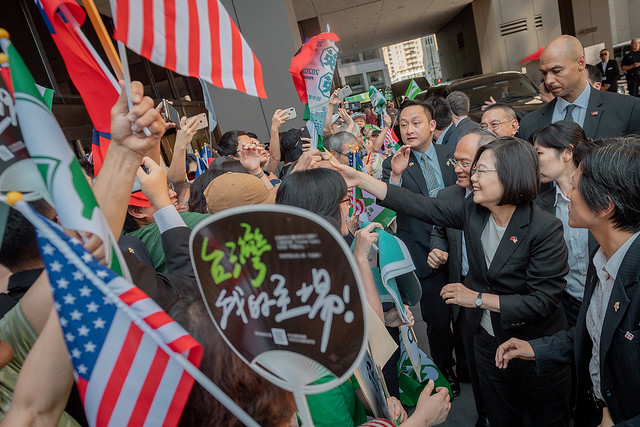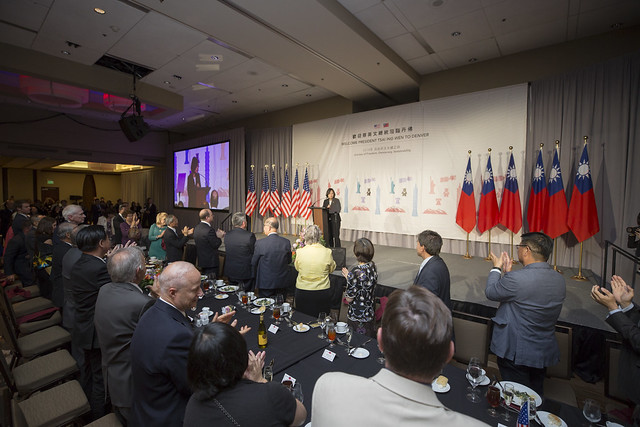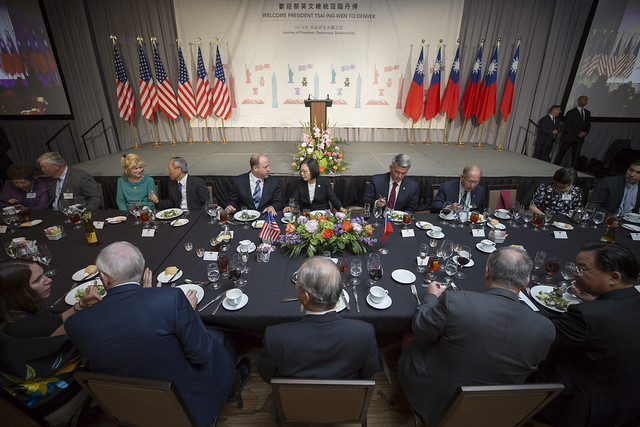News & activities
 News releases
News releases
On the morning of July 19 local time (evening of July 19 Taipei time), President Tsai Ing-wen concluded her visit to St. Lucia and made a transit stop in Denver on her way back to Taiwan following her Journey of Freedom, Democracy, and Sustainability. The delegation's chartered plane arrived at Denver International Airport after a six-hour flight. Taiwan's Representative to the United States Stanley Kao (高碩泰) and American Institute in Taiwan (AIT) Chairman James Moriarty boarded the plane to welcome the president. The president and her delegation subsequently proceeded to their hotel, where she received a very enthusiastic welcome from the overseas Taiwanese community.
In the evening, President Tsai attended a banquet with the local and Taiwanese expatriate communities in Denver. The president thanked the expatriates for their support and said that the government is willing to share with the international community Taiwan's experience and valuable success stories. She reiterated that Taiwan will also stand firm in upholding our democracy, cherishing our freedom, and safeguarding our sovereignty, so that young people will continue to enjoy our free and democratic way of life.
Following is a transcript of the president's remarks:
Good evening everyone. It's great to be here in the Mile High City.
First, I want to take a moment to recognize some of our good friends in the audience tonight. Of course, we have Governor Jared Polis, and Senator Cory Gardner, Congressman Doug Lamborn, and of course, Chairman Moriarty, my old friend, and who was with me in New York as well.
It is wonderful to have all of you here with us, and to see friends of Taiwan here in the US. So let's give our US friends a round of applause for their support.
I also want to thank members of the Colorado House and Senate for their presence today. Thank you. (End of English remarks)
President Tsai continued her remarks in Mandarin and Taiwanese. Following is a translation of her remarks.
I would also like to take this opportunity to introduce three legislators that accompanied us on this trip: Legislators Kuan Bi-ling (管碧玲), Lo Chih-cheng (羅致政) , and Chao Tien-lin (趙天麟). They've been hard at work sharing the successes of our trip on social media over the past few days. Let's have a round of applause for these hardworking members of our diplomatic taskforce!
I hear that the room is packed tonight. Six hundred guests showed up for this event that was meant or four hundred people. Joining us tonight are many friends from out of state, in addition to those from Colorado. They've driven a long way to be here in Denver tonight.
But the person who traveled the farthest to be here tonight is me. I'm the President from Taiwan. Thank you all for driving so far to come to Denver to see me. Really, thank you so much. (End of Mandarin and Taiwanese remarks)
President Tsai continued her remarks in English. Following is a transcript of the remarks:
Denver is a young, diverse city known for its innovation and creativity. More than that, Denver embodies the freedom of the settlers who built this city, who bravely walked a new path to show the way for future generations.
Our Journey of Freedom, Democracy, and Sustainability also led us on a path to find new opportunities for sustainable growth amidst the many challenges that are facing us.
This journey took us to Haiti, Saint Kitts and Nevis, Saint Vincent and the Grenadines, and Saint Lucia. We saw how Taiwan is working with each of these countries to achieve the UN Sustainable Development Goals in the Caribbean.
And seeing this work in person has only reinforced my belief that Taiwan can, and should, do more to help. We have so much experience to offer the world, whether in sustainable development, economic growth, or good governance.
Taiwan's cooperation model is one of reciprocity, of growth that is both tangible and sustainable.
Taiwan is and always will be a champion for freedom, democracy, and the rule of law across the globe.
Many of you have probably read the speech I gave at Columbia University during our transit in New York, where I told Taiwan's story on the frontlines of democracy.
As I prepared to enter the lecture hall that day, a group of Chinese protestors stood across the street, waving banners attacking my freedom of speech, and my duty to speak on behalf of my people.
They sought to use their loud voices to stifle Taiwan's voice of hope, to see us back down in the face of their suppression. But I want to be very clear: The people of Taiwan are not, and will never be, intimidated. And neither was I, as I took the stage that day to proudly share our story.
Each day, Taiwan stands strong in the face of suppression and growing threats, and the world needs to hear this story. In my three years as president, I have worked to make the voices of the Taiwanese people heard. And I intend to continue to do so for another four years as well.
As authoritarian forces seek to subvert freedom around the world, our experiences, and our successes, serve as valuable lessons. Because democracy is our most precious asset, and we must protect it at all costs.
That is why the Taiwan-US partnership, grounded in the values of freedom and democracy, is now more important than ever. The US has long worked to maintain a free, democratic, rules-based international system.
And Taiwan, as a bastion of democracy in the Indo-Pacific, has been an ideal partner in this endeavor.
Our partnership works because we hold many of the same beliefs. Like the city of Denver, we know that the future belongs to the next generation. As president, it's my job to give young people both the freedom to dream, and the opportunity to pursue those dreams.
It's also my responsibility to ensure their right to choose their own future through democratic means. And I take these jobs very seriously.
That is why my administration has continued to push for reforms that will transform Taiwan's economic structure, giving our economy the flexibility it needs to respond to changes in the global trade order.
We have stood steadfast in our defense of Taiwan's sovereignty and democracy. And we are working to counter external forces that look to infiltrate our society by drafting new laws to defend our national security.
Our work has paid off across the board. As the world continues to feel the aftershocks of the US-China trade war, Taiwanese firms are returning to invest in Taiwan in record numbers.
What's more, many of the world's top innovators, such as Google and Amazon, are expanding their investments in Taiwan. They recognize that our democratic system, strong rule of law, and protection for intellectual property rights create a strong ecosystem where they can invest with confidence.
This ecosystem is creating space for young people to innovate and dream big. Seeing the work they are doing, and the vision they have for our future, gives me hope for a brighter tomorrow.
Despite the challenges we face, Taiwan's future is promising. The international community stands with us, and we stand determined to contribute more to freedom, democracy, and sustainable development across the globe. (End of English remarks)
President Tsai continued her remarks in Mandarin and Taiwanese. Following is a translation of her remarks.
Many of you abroad are concerned about Taiwan's future. I know that many of you are very anxious, and feel that China is closing in on us. By using the carrot and stick approach, China wants to force the "one country, two systems" model on Taiwan. Hong Kong is slowly losing its democratic freedoms, so a lot of people are afraid that Taiwan may one day lose its sovereignty and democracy.
Taiwan is indeed under tremendous pressure. But there's only one thing that a President must do: Stand up to that pressure. Like I said, no matter whether I was transiting in New York or Denver, or even making State Visits to our diplomatic allies, China's suppression follows me everywhere.
This is because they do not want to see a President of Taiwan embracing and engaging the world. The more I do, the more they protest.
This freedom to protest can only be enjoyed in democratic countries. Those friends from China should cherish these freedoms that their "motherland" lacks. Just look at what recently happened in Hong Kong, and you will understand how precious freedom and democracy are.
This is not just about protests. For some time now, people have seen China wage information warfare, and use disinformation to infiltrate Taiwan's society. Many international press have commented on how China takes advantage of freedom of speech in Taiwan to interfere in our media and subvert Taiwan's freedom.
Over the past few years, an endless stream of disinformation has come out of nowhere to attack Taiwan, to attack the Taiwan government, and to attack me. Because we have an election coming up in 6 months, these attacks are increasing by the day. Many of these attacks are ridiculous. But if they go on long enough, they can appear to be true.
So when you see questionable information, do not pass it on, immediately investigate, and help clarify it. Those 3 things will help Taiwan defend democracy and protect freedom of speech. Of course, we're already working hard to stop the flow of disinformation that undermines democracy through international cooperation and the amendment of domestic laws.
And I also want everyone to know that I'm doing a lot on social media including Facebook, LINE, and Twitter. So please follow me there to get the fastest, most direct information.
International and domestic suppression by China never stops. However, I can promise you all that no matter how great the pressure, I will stand firm. Taiwan will also stand firm in upholding our democracy, cherishing our freedom, and safeguarding our sovereignty. We absolutely will not buckle under pressure.
I want to remind everyone: For Taiwan, the year 2020 is crucial. This is a test we have to pass. External and internal challenges are growing by the day.
So now more than ever, we have to unite to defend Taiwan's democracy. Not just for yourself, and not just for Tsai Ing-wen. It's for the future of our youth. We must protect their future, so that we can all continue to enjoy a free and democratic lifestyle.
In 2020, it's crucial that we defend democracy. United we stand, divided we fall. Next January, I invite you all to come back to Taiwan. Let's join forces to fight for Taiwan.
Thank you, everyone. Thank you. (End of the president's remarks)
AIT Chairman Moriarty noted in his remarks that the passage of the Taiwan Relations Act 40 years ago laid the foundation for the development of Taiwan-US relations, and these relations have indeed flourished. Taiwan enjoys bipartisan support in the United States. Democratic Taiwan and the United States have many shared values, and this makes people-to-people ties between the two countries all the closer.
Colorado Governor Polis mentioned that it was a great honor to welcome President Tsai to Colorado on behalf of the people of his state, and that he hoped to take this opportunity to expand economic, trade, and cultural exchanges between Colorado and Taiwan. Noting that Taiwan recently became the first country in Asia to legalize same-sex marriage, the governor praised President Tsai for her strong leadership.
Congressman Lamborn, in his remarks, stated that Taiwan and the United States have a deep friendship, and will continue to maintain close cooperative ties moving forward. He also mentioned that he will cooperate with the Trump administration to ensure regular, normalized arms sales to Taiwan.
Senator Gardner said that Asia Reassurance Initiative Act was passed to ensure that arms are sold to Taiwan are normalized. He further pledged that he will continue working to enhance Taiwan-US relations, and will actively push for the signing of a free trade agreement with Taiwan.
Shortly thereafter, Senator Gardner gave President Tsai a copy of the US Congressional Record as a symbol of the excellent friendship between Taiwan and the United States, and several Colorado state senators and representatives presented President Tsai with a Colorado state flag as well as a US flag.












